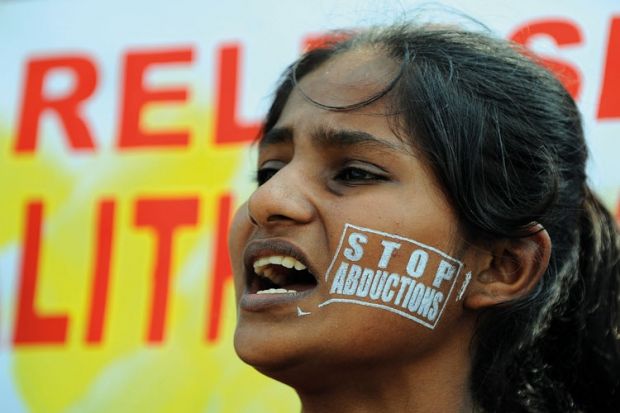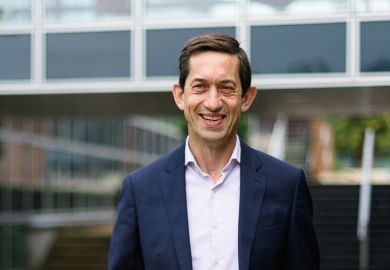Source: Getty
Taking a stand: Amnesty International UK has urged Uclan to note Sri Lanka’s ‘appalling human rights record’, while other institutions have rejected its government’s approaches
“There are very few countries in the world that have an unblemished human rights record, unfortunately,” Malcolm McVicar said of criticisms of the University of Central Lancashire’s planned campus in Sri Lanka. “If we were really, really selective, we might be operating just on the Isle of Wight.”
Dr McVicar, group chief executive officer of Preston-based Uclan, said the university can be a “force for good” in Sri Lanka as he offered a defence of its overseas campuses.
It follows criticism from Amnesty International UK, which urged Uclan to “look beyond the Sri Lankan government’s spin and take note of the country’s appalling human rights record”. Uclan’s Cyprus campus has also been criticised as a security risk by Ban Ki-Moon, secretary general of the United Nations, after it opened in the UN buffer zone. And plans for a campus in Thailand collapsed before the operation got off the ground, losing the university an estimated £3.2 million.
Education, and income and position
Dr McVicar – who was Uclan’s vice-chancellor before becoming group chief executive in charge of the overseas branches – said the campuses give UK students the chance to study overseas and gain language skills, while also providing “high-quality higher education in areas where it wasn’t available”.
But in addition, the sites are “unashamedly about bringing income into the university and strengthening the university’s competitive position”, he continued.
“We have to be realistic. We’re not Cambridge, we’re not LSE…we’re not in a big city, we’re quite a big university, a lot of students come from families where there’s not high income,” Dr McVicar said. “The university needs something extra.”
In Thailand, Uclan entered into a joint venture with Thai businessman Sittichai Charoenkajonkul in which Uclan held a 49 per cent stake. Uclan’s 2012-13 accounts state that “disputes subsequently arose between the parties which resulted in [Uclan] giving notice to the Thai partner leading to the termination of the joint venture agreement” – and a write-off of £3.2 million.
Dr McVicar said that he is “determined that we will recover, if not all, a significant chunk of that £3.2 million”.
Was there a failure of due diligence? “We did due diligence,” Dr McVicar said. “I have asked for an audit to make sure we did everything properly…The auditors are working on that now. I was personally involved in some of the due diligence, and I think we did the due diligence OK. But we’ll wait and see what the audit report says.”
Is it the case that in other sectors, a loss of this scale might get someone the sack? “Well, the person who should be sacked is me – I’m the chief executive. They haven’t sacked me yet,” Dr McVicar joked.
He still believes that Thailand is an excellent location for Uclan to establish a presence – and there will be “an announcement in due course” on the form that presence might take. “Part of the problem is [when] everyone thinks of Thailand, they think of transvestites and girlie bars. It’s actually a very strong economy…Bangkok will be a new Hong Kong,” Dr McVicar said.

‘Working with the people’
In Sri Lanka, at least one other UK university turned down the invitation from the Sri Lankan government to set up a campus.
But Dr McVicar believes that Uclan can play a “useful role – not supporting the government, because that’s not our job, but providing educational opportunities”, while establishing a regional centre that will give the university access to students from southern India.
Is there a worry about working with a government accused of war crimes, after the brutal end to Sri Lanka’s civil war in 2009? “We are working with [Sri Lanka’s] inward investment agency [which is] providing us with some [tax breaks], which is fine. But we are not receiving government money,” Dr McVicar said.
He added: “I make a distinction between the government and the country. We’re in the country, and we’re working with the people of the country. We’re offering opportunities to individuals. We’re not there as a servant of the government.”
In the buffer zone
In Cyprus (“brilliantly located” within easy reach of so many countries, according to Dr McVicar), Uclan operates a joint venture company with a Greek Cypriot developer. The joint venture, in which Uclan holds a 51 per cent stake, leases the buildings from the developer.
Uclan’s share of the losses of the campus amounted to £1.7 million in 2012-13, according to its accounts. However, Dr McVicar argued that such ventures are bound to “lose money for the first five years”.
On the UN criticism of the campus’ location in the mixed Greek-Turkish village of Pyla (the UN worries that students will be entirely Greek Cypriot), Dr McVicar said the campus “got all the official approvals from the Cypriot government, from the local authority”.
But why is it in the buffer zone? Is it because the land is cheaper? “That’s where [the developer] comes from, he’s loyal to his village,” said Dr McVicar.
And he also said: “When they talk about the buffer zone, it’s not like a mile-wide strip that’s bare. It’s just a village…It’s true that every day a white UN Land Rover drives up and down. But the former head of UN security for that area is our security officer, and I’m not conscious of any issues relating to the buffer zone.”
He pointed to the future prospects offered by the “massive oil and gas reserves between Cyprus and Israel”. The Uclan campus has an Institute of Professional Studies that “is training people in the gas and energy industry” and will help the Cypriot economy benefit from those natural resources, he added.
Register to continue
Why register?
- Registration is free and only takes a moment
- Once registered, you can read 3 articles a month
- Sign up for our newsletter
Subscribe
Or subscribe for unlimited access to:
- Unlimited access to news, views, insights & reviews
- Digital editions
- Digital access to THE’s university and college rankings analysis
Already registered or a current subscriber? Login





